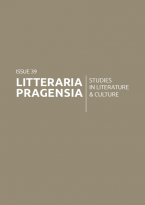
|
20.39 Constructing Cultural IdentitiesEdited by: Martin Procházka, Mirka Horová and Blanka Maderová Volume: 20 Issue: 39 July 2010 |
Contents
|
Martin Procházka
Introduction: Constructing Cultural Identities
|
1 |
|
David Vichnar
Forging "Hesitency": The Writing of History and Identity in James Joyce's Finnegans Wake
show abstract
Joyce's use of portmanteau words and multilingual punning in Wake‐an language destabilizes identity - of language, history, nation, and, last but not least, of itself as text, existing as it does only in the potentially infinite re‐writings imposed upon it in the reading process. The reader's identity, too, undergoes destabilization in that every reading of the Wake becomes split between the eye that registers multiplicity and the voice which can sound only one text in any time and place. This paper proposes to read these concerns in one of the key tropes with which the Wake describes this reader destabilization: "hesitency." Coming as it does from the forged letters of one Richard Pigott who thereby enmeshed Parnell in the Phoenix Park murders of 1882, it might be taken as emblematic of the unity, throughout the Wake, of the specifically historical, the generally textual, and the artistic. Forgery for Joyce appears not only an instrument of colonization subjected to virulent attack, but also a metaphor for artistic creation (Joyce's project, like Stephen Dedalus's, being "to forge in the smithy of my soul the uncreated conscience of my race"), a figure for the nature of writing, not only forged in the sense of writing as technology, as that which is "wrought out of crude matter," but in the Derridean sense of a "divided agency" behind any signature, behind all writing. Joyce's use of Pigott's authentic forgery marked by the misspelling of "hesitency" thus goes beyond mere mocking subversion of colonial ideology and discourse (understood in the complex Foucauldian sense of an "individualizable group of statements" sometimes accounting for "a regulated practice"), posing questions about the very nature of writing and art. |
6 |
|
Radvan Markus
History, Fiction and Identity in the Works of Hayden White and Paul Ricoeur
show abstract
The works of the American historian and theoretician of history Hayden White can prove extremely inspiring for scholars way beyond his original field, mainly due to the stress he places on the constructive nature of historiography and tropological motivation of nearly all discourse in the humanities. In literary theory, his findings have been very significant for the treatment of literary genres which thematise history, such as the historical novel or drama. Throughout his career, White has been criticised for, among other things, his relativism, which allegedly opened ways for openly ideological or morally flawed interpretations of historical events. This paper argues that this relativism is epistemological and not moral, but that the ethical questions related to history are not elaborated in White's work. Therefore it can prove useful to confront White's theory with the philosophy of Paul Ricoeur, especially his seminal book Temps et récit, which, while arguably preserving epistemological relativism, gives significant space to ethical and pragmatic aspects of history. Ricoeur's findings are able to open an inspiring dimension to any thought related to history and fiction, despite the fact that they are based on a limited concept of collective identity and therefore cannot be regarded as the definite solution to these problems.
|
16 |
|
Hana Pavelková
"Give Us the Facts!": Constructing Cultural Identities in David Hare's Via Dolorosa
show abstract
When asked by the Royal Court Theatre to write a play about the Middle East crisis, David Hare decided that the only way to convey what he wanted to say about the region was to reject traditional mimetic theatre and enactment and enter the stage himself instead of the actors. His autobiographical monologue Via Dolorosa might be viewed as a self‐reflexive polemic with "the elaborate conventions of theatre," focusing on the problematic relationship between facts and fiction. This paper not only examines the specificity of the documentary and autobiographical approaches used to construct the identity of all the characters Hare plays, including the autobiographical version of himself, but analyses the main paradox of Via Dolorosa: the fact that the stage presence of the playwright actually subverts his arguments and thus creates dramatic tension and subtly points out that despite its unusual form, Via Dolorosa operates with all the conventional measures of fiction. Audiences should not be deceived by the live presence of the performer's body which has an unusually strong claim to authenticity.
|
30 |
|
Linda Petříková
Against Adaptation: Jean-Luc Godard's King Lear
show abstract
To grasp the relationship between the marginalized picture King Lear (1987) by Jean‐Luc Godard and one of the greatest tragedies proves to be a task in which traditional adaptation discourses that operate with terms such as resemblance or fidelity necessarily fail. This article argues that Godardʹs picture itself sets out to deconstruct the process of adaptation, or the traditional assumptions about it, by radically reconfiguring the relations between image, text and thought, using extreme self‐reflexivity and intertextuality and becoming a mode of thinking King Lear rather than presenting merely another version of the narrative. I have sought support for these arguments mainly in the theoretical writings of Gilles Deleuze including Cinema 2 - The Time‐Image, Proust and Signs and Difference and Repetition, focusing among other issues on the identities of Godardʹs Shakespearean characters conceived as non‐identities, as multiplicities repeated in cinematic history, and on the crucial roles Godard assigns to memory and time.
|
41 |
|
Bronislaw Misztal
An Intellectual Vis-a-Vis the Breakdown of the "Etatistic Order": Between Misunderstanding of the Past and Misinterpreting the Future
|
47 |
|
Blanka Maderová
Ways of Self-making: Emerson, Melville and Bartleby
show abstract
The character of Bartleby has provoked many interesting debates in contemporary discourse on subjectivity, agency and otherness. While Jacques Derrida tries to explore the inarticulable secret of Melville's Bartleby and his responding without response, Emmanuel Lévinas stresses the infinite dimension of the "face" of the other to which one has to respond and Gilles Deleuze tries to think non‐identity and shows various aspects of repetition in speech and images. I will argue in this article that Melville´s "Bartleby, the Scrivener" is a reaction to Emersonian Transcendentalism and pragmatism and that it questions the notion of identity based on performative speech. While Herman Melville concentrated his attention on silence and ruptures in discourse, Ralph Waldo Emerson promoted speech and oratory as constituting the self, as enacting new realities, new laws. Although both Emerson and Melville embrace the transformative self, their use of repetition, difference and their understanding of action differ. The Emerson‐Melville contrast offers new directions of thought in contemporary discussions of agency and the self.
|
55 |
|
Ester Žantovská
The Limits of the Representation of Authenticity: Documentary Drama and Politics Today
show abstract
Documentary (or verbatim) drama - i.e., drama wholly or partially assembled from real life materials such as interviews, documents or media testimony - has enjoyed an immense revival in the past decade or so, especially as an advocate of overt political themes on stage. In the British context, plays of this genre have treated topics of national concern as well as of global importance, from the state of British railways to international terrorism and the war in Iraq. The problems related to contemporary political verbatim theatre transcend purely artistic issues as they cannot be isolated from such phenomena as (auto)censorship, political correctness, audience expectations and the working of the theatre market. The striking number and popularity of such dramas are telling of a certain societal demand for interpretation of global politics on the most immediate level possible. The main aim of the article is to analyze the way these dramas pose crucial questions concerning objectivity and authenticity as well as the effects of discourse employment and its connection to identity construction - topics almost entirely overlooked in critical accounts.
|
73 |
|
Mirka Horová
The Dynamics of Desire: Constructs of Identity in Byron's Sardanapalus
show abstract
Byron's drama Sardanapalus is laden with numerous subversions, perversions and inversions. Apart from engendering the famous hippie hymnus amoris, "Come on, baby, light my fire," with unprecedented literary connotations, it interrogates the boundaries of gender and genre, masculinity and femininity, subject and abject, liberalism and imperialism, and their performance. In Byron's adaptation of the legendary fall of the ancient Assyrian empire, the regulative discourse of masculinity is uncovered as a social, political and cultural construct, tracing the failure of the patriarchal regime to legislate or contain its ideals. Through the carefully crafted love relationship between the eponymous monarch and his Greek slave, Myrrha, Byron lays bare the intricacies of desire, not merely sexual, but also the symbolic desire for the Other.
|
92 |
|
Stanislav Kolář
The (Post)colonial Search for the Identity of Caribbean American (Grand)daughters
show abstract
This essay analyzes two literary works - the short story "To Da‐duh: In Memoriam" by Paule Marshall and the novel Lucy by Jamaica Kincaid. Both authors are Caribbean American writers; Paule Marshall was born in Brooklyn, New York, in 1929, however, her family roots stretch back to Barbados, while Jamaica Kincaid (born in 1949) comes from Antigua. Their writings aroused considerable interest among postcolonial literary critics particularly for their accent on the reflection of cultural interaction between the colonized and the colonizer. In both works, female protagonists negotiate their identity through the confrontation of Caribbean and American culture. They strive to find their own voice, distinguishable from others, mostly through resistance. In doing so, they become subversive to opposing forces in an effort to retain their individuality. Their encounter with a different culture can lead to cultural conflicts and misunderstanding of ‘otherness' but also to mutual cultural enrichment, partly overcoming seemingly insuperable barriers; this is apparent especially in Marshall's story. The paper also explores how cultural borders persist due to the remaining colonial mentality and ethnocentric prejudices of the dominant society.
|
99 |
|
Hana Waisserová
The Identities of Critical Cosmopolitans in Arundhati Roy's God of Small Things and Jhumpa Lahiri's The Namesake
show abstract
Within internationalized English fiction, Lahiri's The Namesake and Roy's The God of Small Things represent voices of critical cosmopolitanism. They describe ethnic cosmopolitans and postcolonial global migrants, and open debates on belonging and naturalization within national, transnational and even nationless spaces. This article focuses on cosmopolitan transcultural space, which allows for the existence of the gendered critical cosmopolitan characters of Roy and Lahiri. While cosmopolitanism has been stripped down to artificial aspects of a cultural construct and is criticised for hardly addressing the immigration identities in full complexity (Appadurai), it is also treated as a positive concept that appreciates differentiation rather than simple negations (Hall). Though cosmopolitanism is scrutinized and distinguished according to current needs of modern critical realms, e.g., as vernacular (Bhabha), wounded (Kristeva), or subaltern (de Sousa Santos), this article rather focuses on critical cosmopolitan space and scape as such. Critical cosmopolitanism implies the use of double consciousness, comparisons or self‐reflections, but also critical internationalism and critical globalization, as well as a new reflection on reflection. It explores Roy's and Lahiri's gendered‐specific identities of critical cosmopolitans who operate in a literary contact zone. The literary contact zone represents a space for creating literary identities; it is an amalgamation of Pratt's notion of "contact zone" and Appadurai's discussion of "ethnoscape in deterritorialized space." The discussion of Roy's and Lahiri's projected transnational consciousness and identification is complemented by selected theories of diaspora (Gilroy, Hall, Appadurai, Pratt) and cosmopolitanism (Appadurai, Walkovitz, Nussbaum, Kristeva).
|
115 |
|
Review of
Mária Kurdi
Literary and Cultural Relations: Ireland, Hungary, and Central and Eastern Europe
Dublin:
Carysfort Press, 2009. 263 pp.
→ Maciej Ruczaj, Irish-Central European Literary Encounters
|
132 |


